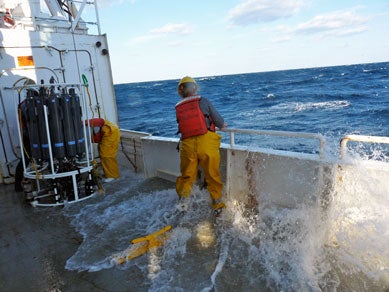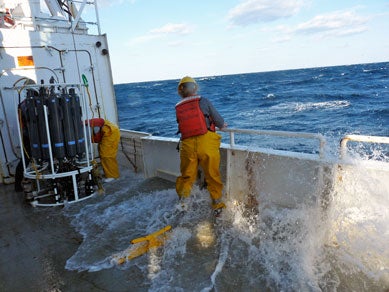 They’re all topics that students and faculty at the University of Rhode Island’s Graduate School of Oceanography will discuss at an upcoming meeting of oceanographers from around the world.
They’re all topics that students and faculty at the University of Rhode Island’s Graduate School of Oceanography will discuss at an upcoming meeting of oceanographers from around the world.
Scientists will present their research at the 2016 Ocean Sciences Meeting in New Orleans, from Feb. 24 to 26—a conference held once every two years that is expected to attract 4,000 participants.
The event is important for two reasons: Faculty and students have a chance to share their work with their colleagues, and students get an opportunity to make contacts for post-doctoral research or other employment after graduation.
“In addition to learning about the latest research, the Ocean Sciences Meeting provides a great opportunity to talk with our peers at other oceanographic institutions and to program managers regarding trends in funding, as well as a chance to reestablish connections with our alumni,” says Bruce Corliss, dean of GSO.
The topics reflect the range and depth of research at URI’s Narragansett Bay campus: studies of ocean temperature; computer models of climate change in the Arctic; the effect of carbon dioxide on plankton; waves and hurricane intensity; and more.
This year’s presenters include students from GSO’s much-heralded summer program for undergraduates, a graduate student from Iran, faculty members looking at science education in the public schools, and a new faculty member studying winter temperatures in Europe.
* Dwight Coleman, director of the Inner Space Center, will talk about the importance of bringing live broadcasts of the voyages of URI’s research vessel, “Endeavor,” to the public, and Associate Director Gail Scowcroft, who has led marine science and climate change education programs at GSO since the 1990s, will focus on ways to improve ocean science education at elementary and high schools.
* Chris Roman, an associate professor of oceanography, will talk about an instrument he’s created that enables him to measure the ocean’s temperature and salt content at much higher spatial resolutions.
* Arash Bigdeli, a doctoral student from Iran who recently earned his master’s from GSO, will deliver a presentation about his work in the Arctic on gas exchange between the ocean and the atmosphere, and the role ice plays in the process.
* Graduate student Brennan Phillips will report about the state-of-the art ultra-low light microscopy cameras he uses to observe the deep, dark regions of oceans.
* How sea surface temperature in the North Atlantic influences winter temperatures in Europe over time will be explored by oceanographer Jamie Palter, who joined the GSO faculty this fall from McGill University.
Two young scientists who attended the GSO’s 10-week summer program for undergraduates will also present papers: Joshua Port will report on the effect of waves on hurricane intensity, and Nicole Statler will explain how she calculated average tide levels at the coastal parks during full and new moons, when the tides are higher than average.
Statler studied Boston Harbor Islands Recreation Area; Dateway National Recreation Area in New York and New Jersey; Assateague Island National Seashore in Maryland and Virginia; and Fire Island National Seashore in New York, where she did field work.
The study will help scientists measure tide levels at the parks and the influence of possible flooding on birds and other habitat in marshes, says Amanda Babson, an oceanographer with the National Park Service, which is on the Bay campus. Babson helped with the research.
“The summer program was a great experience,” says Statler. “It was one of the best summers I’ve ever had. Getting that research experience was so important to me, and getting the chance to present my work just blows me away.”
The Ocean Sciences Meeting is sponsored by the American Geophysical Union, the Association for the Sciences of Limnology and Oceanography, and the Oceanography Society.
Sessions for the scientists, engineers, educators, policy makers and students involve all areas of oceanography, as well as presentations about new and emerging research, including science education, science outreach and public policy.
“This is the premier meeting of the oceanography community in the country,” says David Smith, associate dean of GSO. “It gives our students a chance to showcase what they’re working on, and also helps them plan their next career step.”
Corliss will host a reception Feb. 22 from 6 to 8 p.m. at the Hilton Garden Inn New Orleans Convention Center in the Magnolia/Camellia rooms for GSO friends, GSO alumni and GSO faculty, students, researchers and staff attending the conference.
For a list of GSO presenters and posters, please visit Ocean Sciences Meeting.
Pictured above: Researchers aboard the “Endeavor,” a research vessel at URI’s Graduate School of Oceanography in Narragansett. Photo by Leslie Smith.

